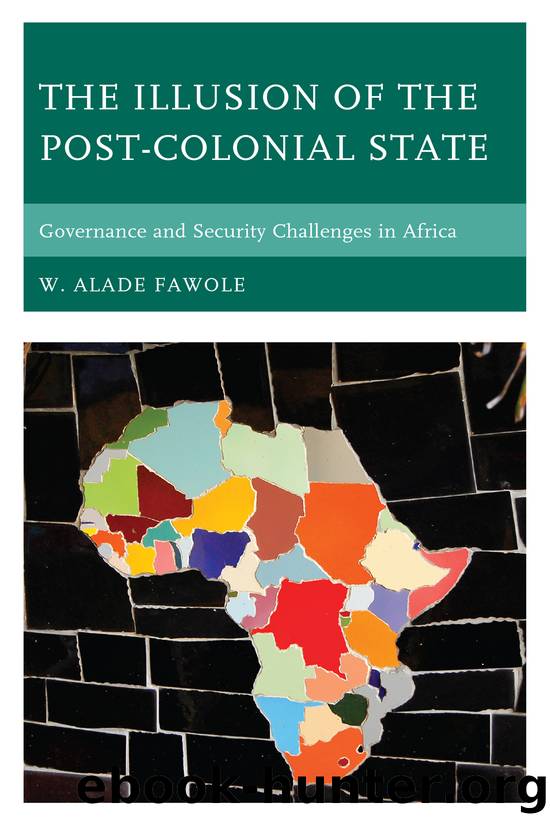The Illusion of the Post-Colonial State by Fawole W. Alade;

Author:Fawole, W. Alade;
Language: eng
Format: epub
Publisher: Lexington Books/Fortress Academic
Chapter 8
Mali
From Instability to Insurgency and Near Obliteration
Before its summary decapitation by armed northern-based Tuareg separatists and their jihadist supporters in 2012, the vast but sparsely populated, landlocked West African country of Mali had a rather checkered history. From the time of its colonization by France, it was never a territory that was even remotely destined for united existence. As was common with balkanization of colonized Africa into individual territorial possessions of the respective metropolitan powers, French colonization also forcibly corralled several disparate ethnic, linguistic and racial groups, with distinctive cultures and sometimes without previous history of close interactions, into a single territorial compact for the sole purpose of plunder. Mali is geographically vast, a cavernous country more than twice the size of France itself, with large swathes of its territory either uninhabited or sparsely populated by nomadic peoples, especially the large northern portion that is home to the Tuaregs, a distinct racial group from the blacks in the south. About 90 percent of Maliâs population, which is predominantly black, occupies the southern portion around the capital city of Bamako. As a colonial territory it was administered by force rather than consent, and France did practically nothing to integrate especially the nomadic Tuaregs in the north of the country into the mainstream of its colonial administration. It preferred instead to hold them in subjection by military force largely because of their early resistance to foreign influence. This colonial style invariably created disunity within the territory that lasted until Franceâs exit in 1960. This disunity that Franceâs colonial policy had deliberately embedded in the countryâs political architecture survived and has remained to haunt and hobble the country since its independence in 1960.
Todayâs Mali was originally only a portion of the vast French colonial possessions stretching across West Africa, then known generally as âFrench Soudan.â Toward the end of colonial rule, it became an integral part of what the French called âthe Mali Federationâ that joined together todayâs Senegal and Mali, until independence was granted in 1960 when the federation broke acrimoniously into two separate nation-states. French colonial rule was largely imposed and sustained by military force, especially in northern Mali whose inhabitants severely resisted the imposition of foreign rule and fought a series of devastating pitched battles with French forces in the late nineteenth century. Indeed, it was not until the early part of the twentieth century before the largely nomadic Tuaregs could be brought under French rule as part of todayâs Mali. This mode of colonization invariably left a deep-seated schism in the country, a schism which would come to haunt and hobble the countryâs domestic politics after independence.
Mali was subjected to Franceâs characteristic iron-fisted rule even as France was trying to sustain the same pretense that its colonial enterprise was a civilizing mission intended to bring the benefits of modern European civilization to primitive natives of the colony. The reality of course was that no one but France itself was fooled, as all its colonial policies in Mali purposely discriminated against the same natives and hampered their development.
Download
This site does not store any files on its server. We only index and link to content provided by other sites. Please contact the content providers to delete copyright contents if any and email us, we'll remove relevant links or contents immediately.
The Secret History by Donna Tartt(19052)
The Social Justice Warrior Handbook by Lisa De Pasquale(12187)
Thirteen Reasons Why by Jay Asher(8893)
This Is How You Lose Her by Junot Diaz(6877)
Weapons of Math Destruction by Cathy O'Neil(6265)
Zero to One by Peter Thiel(5786)
Beartown by Fredrik Backman(5737)
The Myth of the Strong Leader by Archie Brown(5499)
The Fire Next Time by James Baldwin(5431)
How Democracies Die by Steven Levitsky & Daniel Ziblatt(5215)
Promise Me, Dad by Joe Biden(5141)
Stone's Rules by Roger Stone(5081)
A Higher Loyalty: Truth, Lies, and Leadership by James Comey(4954)
100 Deadly Skills by Clint Emerson(4921)
Rise and Kill First by Ronen Bergman(4779)
Secrecy World by Jake Bernstein(4741)
The David Icke Guide to the Global Conspiracy (and how to end it) by David Icke(4707)
The Farm by Tom Rob Smith(4502)
The Doomsday Machine by Daniel Ellsberg(4484)
